

Coastal GasLink has cleared kilometres of forest in Wet'suwet'en territory for a pipeline. The Unist'ot'en hunt and gather medicine on the land.
Josiah Neufeld and Allegra Friesen Epp were part of a five-person team that spent most of this past June at Unist’ot’en Camp in Wet’suwet’en territory in northern B.C., a place that has become a site of resistance by Indigenous peoples against energy extraction projects for decades, as well as a place of healing and cultural resurgence.
In 1997 the Supreme Court ruled that the Wet’suwet’en never relinquished title to their territory. Despite this ruling government and industry have prioritized resource development in the area. In 2010, Freda Huson, a Wet’suwet’en matriarch, built a cabin at Unist’ot’en, a clan within Wet’suwet’en territory, to assert her peoples’ rights to say no to extraction on their land. Unist’to’ten Camp has been running since that time.
Neufeld and Friesen Epp, along with Steve Heinrichs (director of Indigenous-Settler Relations for Mennonite Church Canada) and two representatives from Christian Peacemaker Teams, quarantined in a bunk house at the camp for the first two weeks of their stay and then met with the Unist’ot’en and other supporters at the Unist’ot’en Healing Centre, to listen and learn from members of the community.
In the following interview, they share what they did at the camp, the conversations they had with Elders, what they learned and what they believe the church’s role is in supporting Indigenous communities on the frontlines.
Josiah Neufeld attends Hope Mennonite Church in Winnipeg. He is a writer and climate justice organizer, working with Manitoba Energy Justice Coalition. Allegra Friesen Epp attends Home Street Mennonite in Winnipeg and is a joint intern for Mennonite Church Canada and Christian Peacemaker Teams. For a photo of the team and a pre-trip interview with Friesen Epp click here.
This interview has been edited for length and clarity.
Josiah, why was it important to you to go on this trip?
I was involved in organizing solidarity actions in Winnipeg when the RCMP raids happened on Wet’suwet’en territory in early 2020. What’s happening in Wet’suwet’en is one of many examples across Canada and the U.S. of Indigenous resistance to fossil fuel development. We’re in a climate emergency. Everyone needs to be asking themselves, what am I doing for climate justice right now? The people most affected by climate change are those least responsible for the problem. In Canada, that’s Indigenous communities. Their lands are taken away and cultural practices are endangered as a result.
Tell me a bit about where you stayed?
Josiah: After quarantine we stayed at the Healing Centre, which is in the forest, 66 kilometres southwest of the town of Houston. This is right in the middle of 22,000 square kilometres of Wet’suwet’en territory.
The Healing Centre was built at the camp in 2015 and is a place where the Unist’ot’en connect with the land, hunt and fish, and gather medicines. The centre has guestrooms and rooms for counselling. Indigenous youth come out there for culture camps. It's a place of healing and cultural resurgence. The centre is no longer directly in the path of a pipeline because Coastal GasLink moved the pipeline route over to avoid it, but the camp remains a site of active resistance.
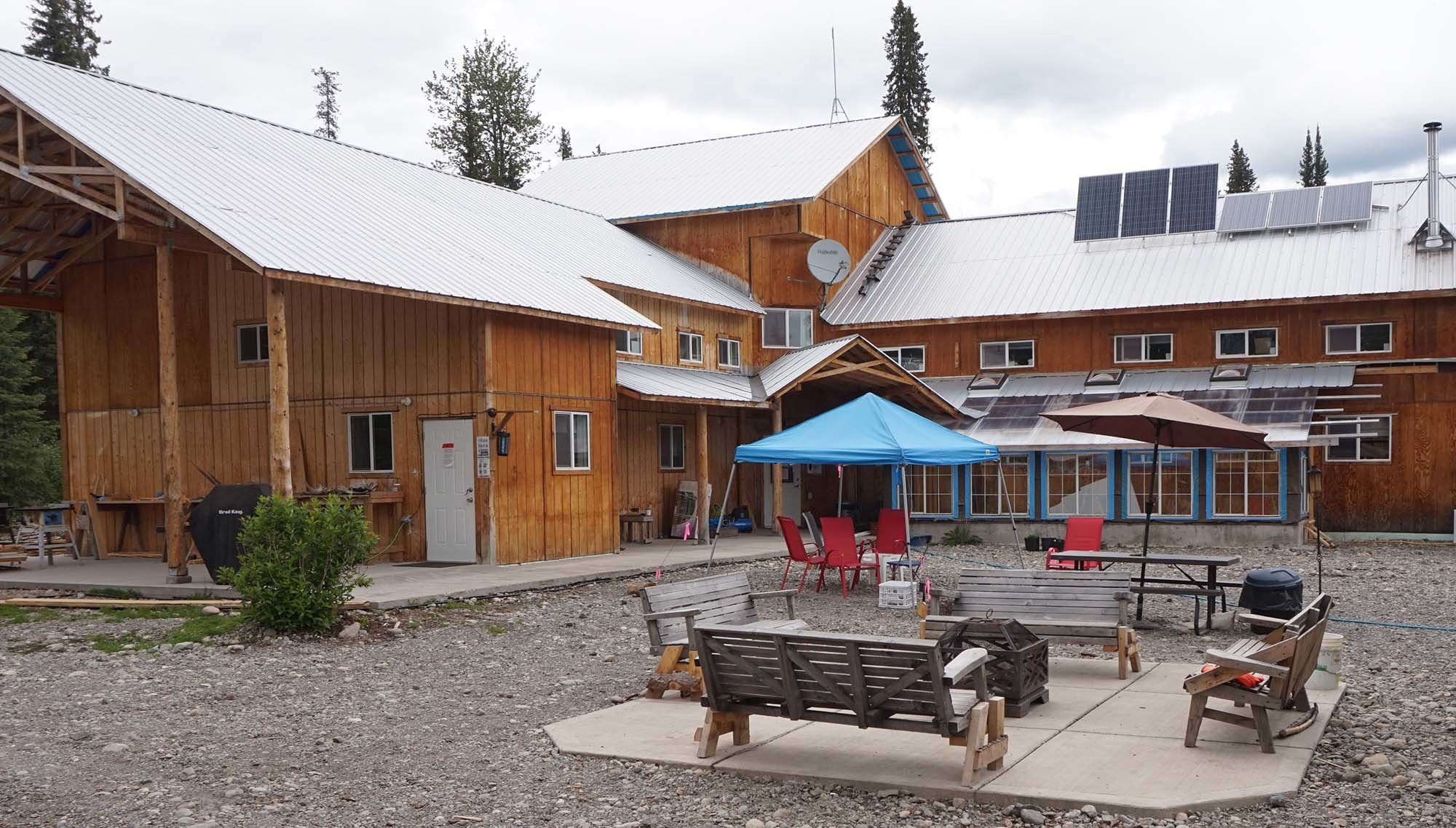
The Unist’ot’en Healing Centre (Source: Josiah Neufeld.)
What was a typical day like for you?
Allegra: During quarantine period we helped with tasks around camp, which varied day to day: chopping wood and preparing kindling for the winter months; putting siding on a new greenhouse; clearing a path in the bush from the logging road to a pit house, which is a traditional Unist’ot’en dwelling; we dug a trench for an electrical cord. Afterwards we shared meals with those at the camp. It was meaningful to hear stories from Elders and to build those relationships. There was free time on evenings and weekends to hang out, rest, go into town if the logging road was in decent shape.
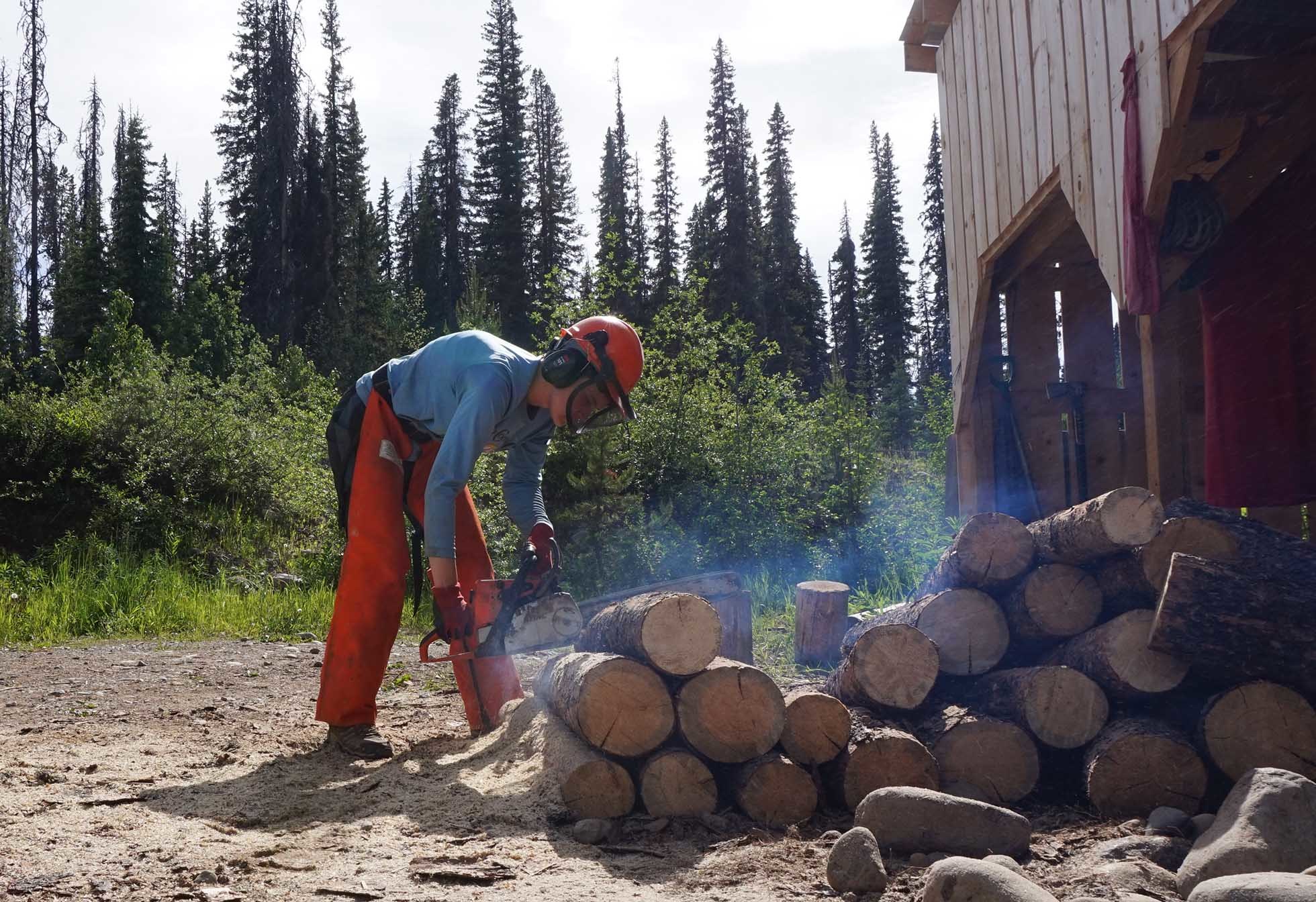
Friesen Epp chopped wood around camp. (Source: Josiah Neufeld.)
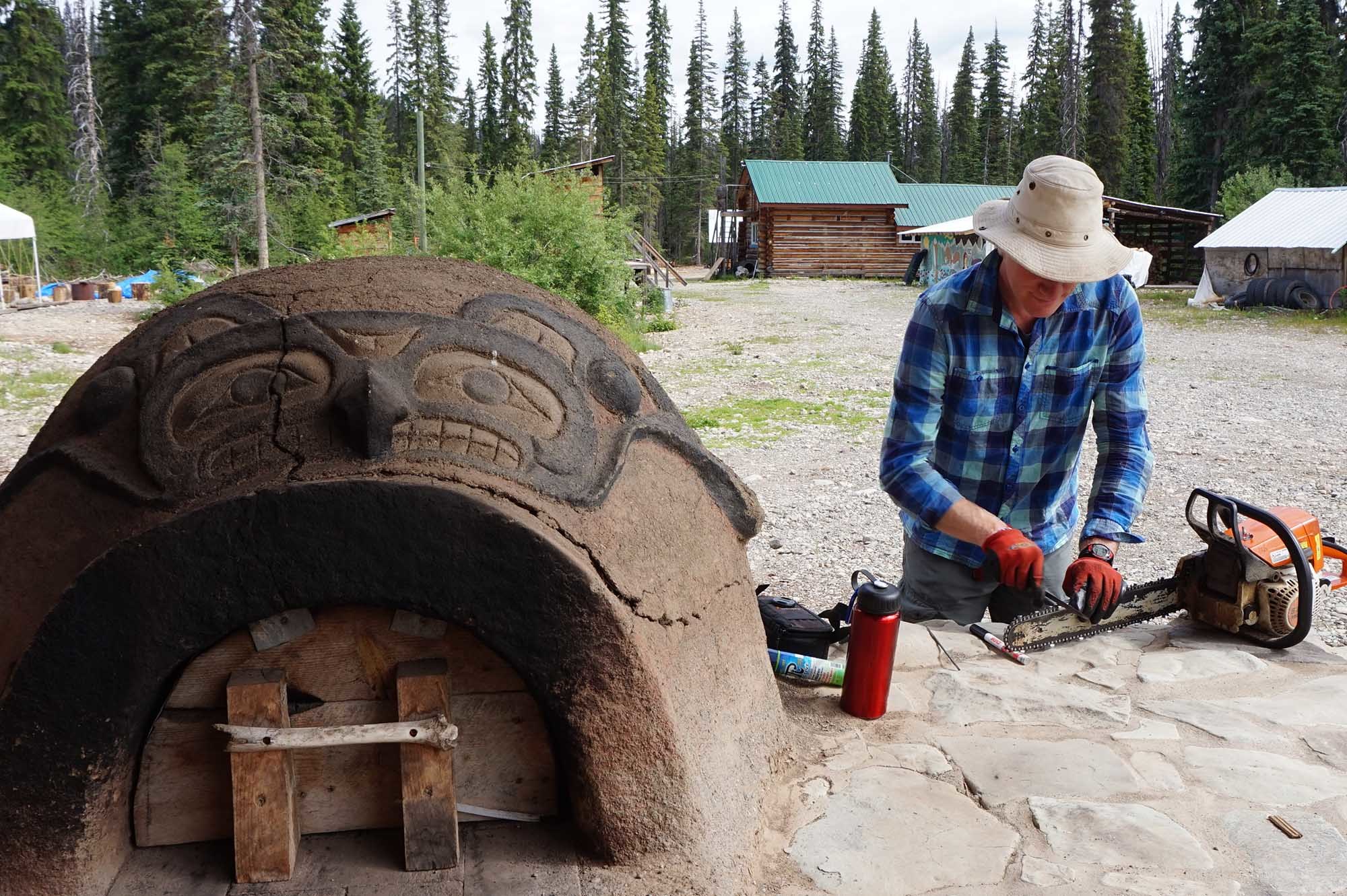
Neufeld also helped chop wood. (Source: Neufeld.)
Why were the meals meaningful for you?
Allegra: People in the Church know there's something beautiful about sharing food. To eat with the Wet’suwet’en matriarchs, the people who founded this camp and whose ancestors have lived on that territory for centuries and millennia, was to share sacred space. To hear their stories of growing up on the land, of living on the land now, brought the experience to life. It was a real honour to be in the presence of such powerful and resilient women.
Are there other things, things that you saw, heard, or did that were significant for you?
Allegra: I witnessed the incredible determination and strength of the Wet’suwet’en, but at the same time I witnessed profound devastation due to blatant colonialism. Every day Coastal GasLink trucks drove on the logging road beside the camp without permission. Our group visited the pipeline path, which is a kilometre from camp. It is a horrific scene. Trees are toppled and mulched and a whole swath of the forest is wiped out for the pipeline to go through.
Josiah: People we met used to hunt, had trap lines and gathered soapberries on the pipeline path. While we were there, heavy machinery was moved in to begin digging. The whole project affects wildlife. Coastal GasLink is also preparing to drill underneath the river that supplies water to the camp. There’s a concern the drilling will contaminate the river, which we drank from while we were there.
Coastal GasLink impinges on everyday life for the folks living at this camp. While we were there, the company sent a drone to survey a couple of us who were doing work in the forest. The roads are damaged by the heavy machinery. Industry employees fish and camp in areas without permission. Trucks have started bringing cattle to graze on areas of the land without permission. The Wet’suwet’en push back against all these incursions to reassert their right to the territory. If they don't, it slowly gets taken away from them.
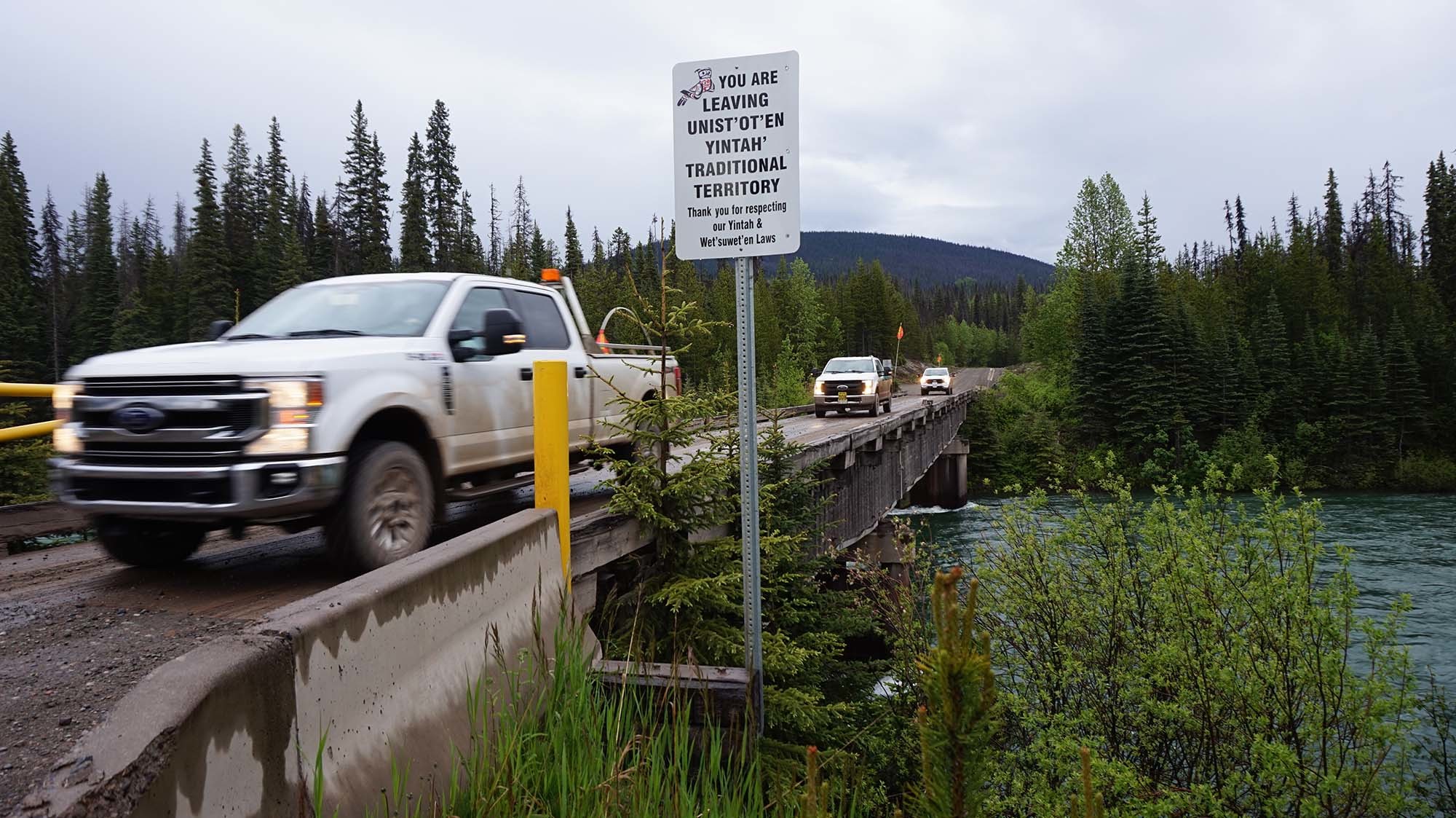
Coastal GasLink trucks continuously drive on the logging road without permission from the Unist’ot’en. (Source: Josiah Neufeld.)
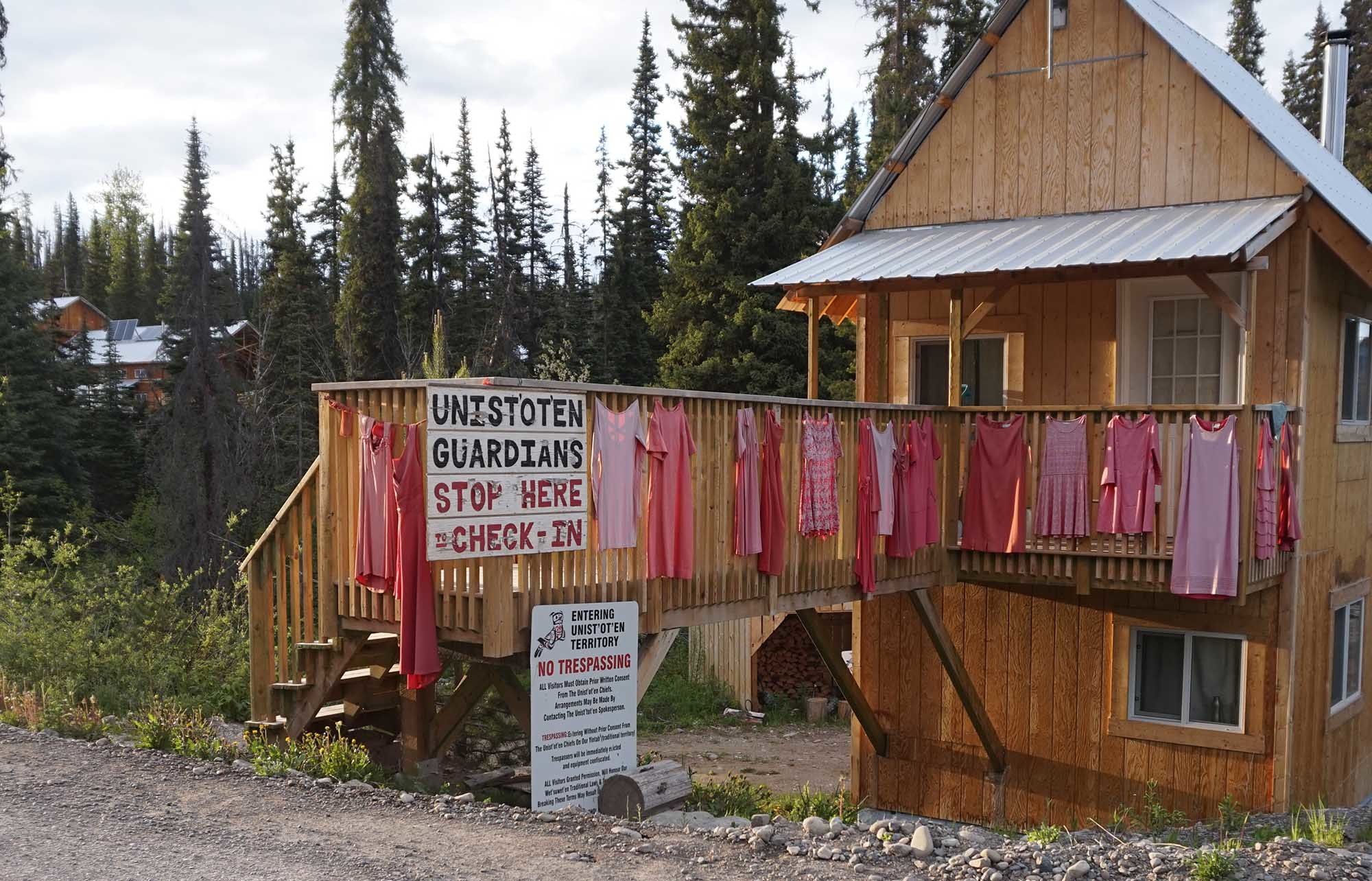
The check-in point for visitors in Unist’ot’en territory. (Source: Josiah Neufeld.)
Can each of you describe a meaningful conversation that you had with someone?
Allegra: Freda Huson warned that the capitalist economy will one day collapse in on itself. In light of that, she said, “My people know how to survive on very little. When disaster happens, we are going to be okay. My pantry is stocked and we have known how to live off the land for generations.” She said it’s people who live in luxury and in continual abundance who will struggle. It was a profound and disturbing wake-up call.
What are the consequences of hearing that for you personally, Allegra?
Allegra: It’s a call to live simply. And a reminder that we will not save the earth without Indigenous sovereignty and Indigenous leadership. As settlers, we have so much to learn from Indigenous communities about what it means to care for the earth and to love Creation.
It’s a call to live simply. And a reminder that we will not save the earth without Indigenous sovereignty and Indigenous leadership.
What about a meaningful conversation that you had, Josiah?
Josiah: I was struck by hearing the elders talk about the different plants and medicines that they gather on the territory, what they use them for, which ones are edible and which ones are used for healing. There's not the separation between the environment and spirituality and the economy that we have in Western, capitalist society where those are separate things. For the Wet’suwet’en, the health of all of them is interconnected. That was a powerful learning for me.
What are the consequences of learning that for you?
Josiah: I carried away a deeper understanding of how decarbonizing our society is interconnected with decolonizing our society. Indigenous sovereignty is climate justice. One can't happen without the other. Witnessing what was happening gave me new insights and new energy for the work that needs to be done in the context where I live, in Winnipeg Treaty One territory.
For instance, a few days after we got back from our trip, there was the big march on Canada Day acknowledging the graves found at residential schools. There was a prayer camp set up the legislative grounds to recognize the incredible harm that's been done. Part of the work I can do is bring water, firewood and food and show up in solidarity. It's not a separate issue. It's all interconnected.
What is the church's role in all of this?
Allegra: I see the Church engaging these frontline struggles. We are being invited into these spaces and we need to honour the invitations. I dream of the Mennonite Church sending more groups to Wet’suwet’en and other Land Back camps. I dream of the church funding efforts for land reparations or for healing centres throughout Turtle Island, like the one we visited. These are tangible ways we can commit to reconciliation.
During one of my brief dips in the Wedzin Kwa (Morice River), I suddenly wondered what it would be like for the church to practice a ritual like baptism in the Wedzin Kwa, to practice ritual in a place where the struggle is so real, where justice flows so strongly, like the current of the river. What if we not only embodied our commitment to our own church communities, but we also to our Indigenous neighbours and to those on the margins of society who are asking for our solidarity and our allyship.
We're in a climate emergency. We need everybody on board to unite and to work together.
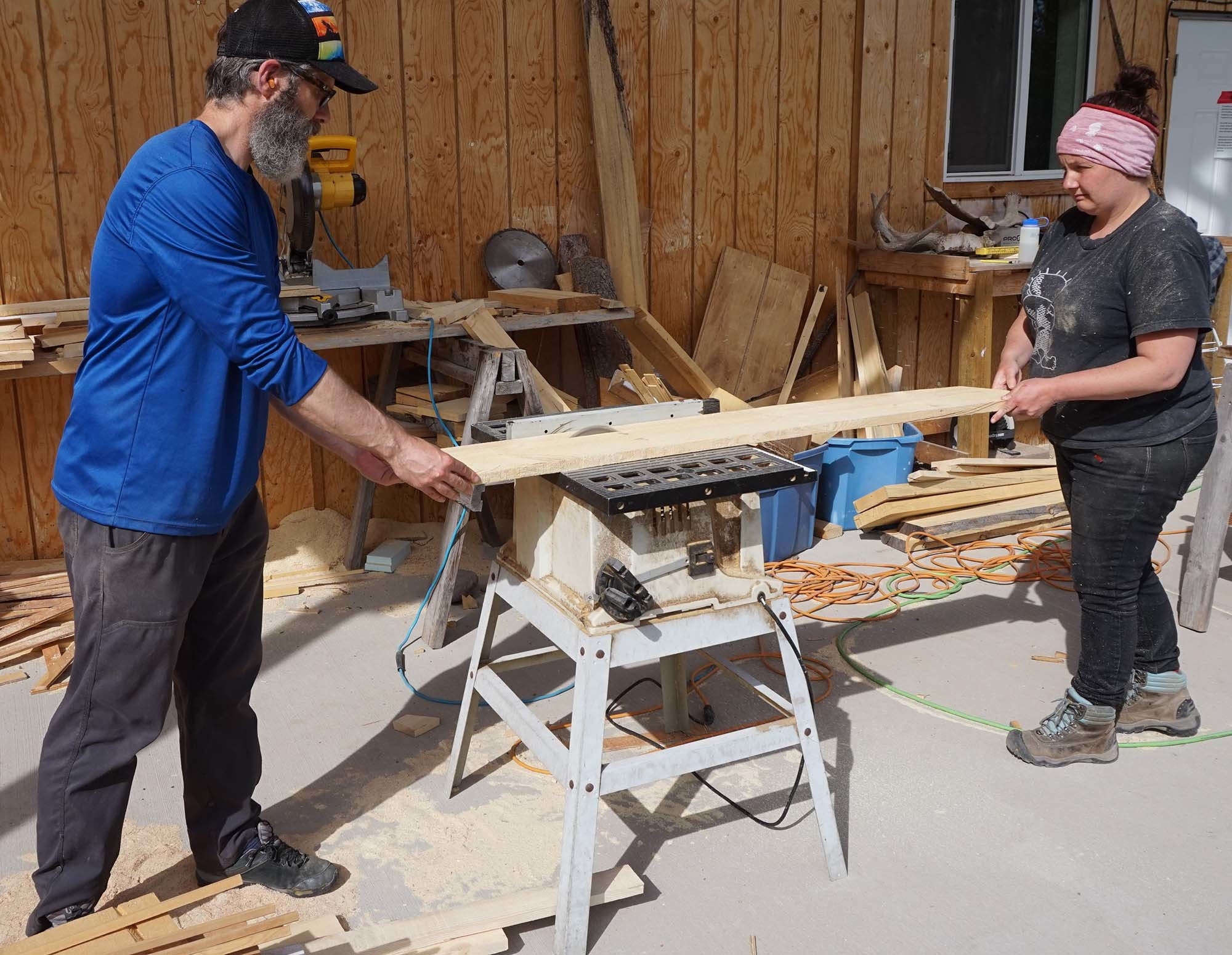
Mennonite Church Canada ISR Director Steve Heinrichs and CPT Canada Coordinator Rachelle Friesen work together at the camp. (Source: Josiah Neufeld.)
Josiah: We're in a climate emergency. We need everybody on board to unite and to work together. Right now, people are getting arrested every day in Minnesota, blocking Line 3, a pipeline that crosses Indigenous lands, rice fields and waterways. It goes right under our feet here in Manitoba, so it's not somebody else's issue. It's a Canadian company and connects all of us. Indigenous communities in northern Manitoba are also speaking out about how hydroelectric dams have harmed their communities and their lands.
These sites of Indigenous resistance, resurgence and sovereignty exist everywhere. We need more church people to show up not with an attitude of “Oh, I'm going to save the day,” but “What can I do to help?” There are thousands of ways of supporting this work, to be present, listen, hear stories and build relationships. It’s easier than it seems.